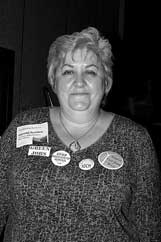Voices from the Field: Citizen activists speak about what inspires them to stand up and take action
Lorelei Scarbro is no stranger to the economic support coal mining has brought to West Virginia. Her grandfather, father, and husband were all underground miners. She is also no stranger to its downsides. Black lung made her a widow before she turned 50, and now the threat of mountaintop removal mining, slurry impoundments, coal dust, and tainted water loom heavy on her community of Rock Creek, W. Va. Now 54, Lorelei is one of the most dedicated coalfield activists in the fight to end mountaintop removal. She travels monthly to Washington to meet with legislators about critical legislation that would put a federal ban on valley fills, part of the process of mountaintop removal where literally tons of exploded mountain are deposited in mountain valleys as a crude, destructive form of “waste disposal.” Lorelei spoke with The Voice about mountaintop removal, activism, and what inspires her to fight.
AV: Why did you first decide to go to Washington to advocate for an end to mountaintop removal?
LS: I believe what is happening here [in central Appalachia] is a social justice issue and a crime against nature. I know the people in Washington, D.C., have the power to stop this. Unless we are there telling them how [mountaintop removal] impacts the lives of real living, breathing human beings, they don’t know. The coal industry tells them there are no people living in the area where they mine. But I say, we don’t live where they mine coal, they mine coal where we live.
AV: If your husband were alive, what do you think he would say about mountaintop removal coal mining?
LS: My husband was a very proud underground union coal miner and he was also very connected to and protective of this place. He loved the land and grew up living off it. He quit school when he was 16 years old to work in the mines to help his parents feed and clothe his brothers and his sister. He harvested coal because it was the only way to make a living, but he never did anything to harm the land. He would be outraged [about mountaintop removal] and very proud of me for the stand I have taken to protect the land he loved.
AV: How long have you been an activist?
LS: I started as a community activist on another issue in early 2001. The local Board of Education decided to implement a planned closure for our local high school. Some of my closest friends and I decided that was not a good idea and we engaged in a two and a half year battle to stop it. We won the battle and lost the war. Today, the coal company is removing the top of the mountain behind where the school used to sit.
AV: With difficulties, including threats and anger from your neighbors, why have you not just given up?
LS: I have a five-year-old granddaughter and it pains me to think of the quality of water she will have to drink and the air she will have to breathe when she is of child-bearing age if we don’t stop this. It is not about me. I have a responsibility to do all I can to leave this world a better place than I found it for her and the generations to come after me. That being said, I can’t stop.
AV: What is the best experience you have had during your time as an activist?
LS: Standing with Larry Gibson [a fellow coalfield activist] in D.C. on March 2, 2009…we turned and looked down the street to see 2,500 people coming toward us standing in solidarity against the evils that are inflicted upon us by the coal industry. Because of his 20+ years in this battle and all that he has sacrificed I told him, “Look what you have done.” Many of us would not have had the courage to do what we do without what [Larry] has done.
AV: What is the worst experience you have had during this time?
LS: I cannot think of any one incident but the hardest thing is watching people suffer adverse health effects due to coal.
I watched my husband struggle for every breath until his last with black lung, I have friends who live in communities where large numbers of them have terminal illnesses, and I fear for my own longevity because of water and air contamination.
AV: Who would you say is your hero or heroine, and why?
LS: The people who risk their lives expecting nothing in return to stop mountaintop removal. There are a lot of them but Larry Gibson in particular is my hero and the biggest man I have ever met.
Related Articles
Latest News

Leave a comment
Your email address will not be published. Required fields are marked *






Leave a Comment